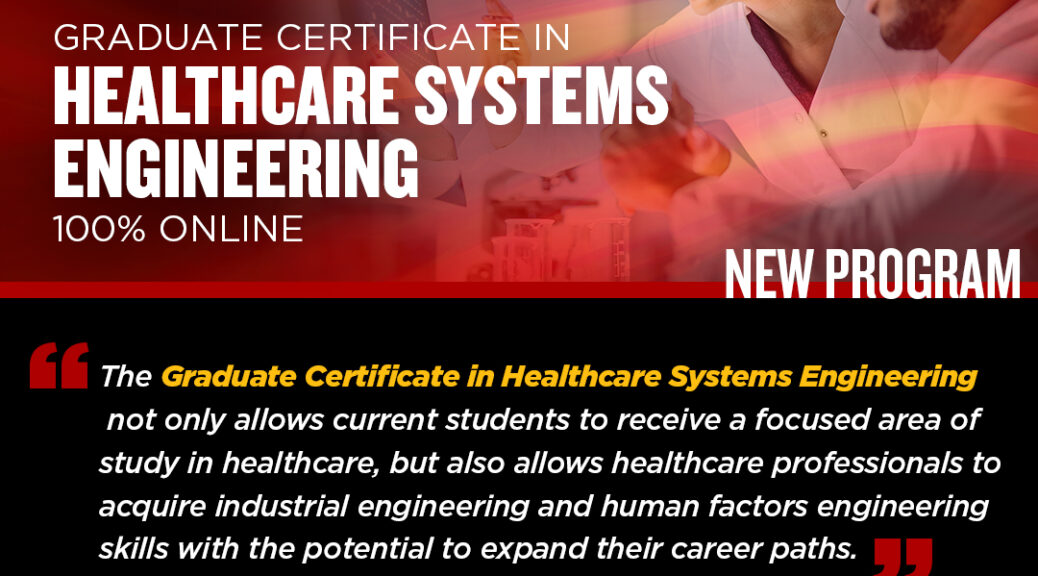
New Online Program Launch: The Power of a Graduate Certificate in Healthcare Systems Engineering
We are thrilled to announce the launch of our newest online program, the 100% online and asynchronous Graduate Certificate Healthcare Systems Engineering. This degree is ideal for current and future healthcare professionals who are looking to enhance their skillset, improve healthcare processes and procedures, and advance professional leadership roles by gaining technical skills in analytics, predictive modeling, patient safety, and health IT. The online Graduate Certificate in Healthcare Systems Engineering is a 9-credit hour program, with each course delivered in an 8-week course format, 100% online.
In the rapidly evolving field of healthcare, effective management and optimization of healthcare systems have become crucial. As the demand for high-quality and cost-effective care continues to rise, healthcare organizations are increasingly turning to professionals with expertise in healthcare systems engineering. Our program offers the opportunity for individuals seeking to make a significant impact in the healthcare industry by applying engineering principles and strategies to improve healthcare delivery, patient safety, and operational efficiency.
Healthcare Systems Engineering is an interdisciplinary field that combines principles from engineering, operations research, management science, and healthcare management. It focuses on developing and implementing innovative solutions to enhance the performance of healthcare systems, including hospitals, clinics, long-term care facilities, and healthcare supply chains. By employing engineering methodologies, data analysis techniques, and process improvement strategies, healthcare systems engineers aim to optimize workflows, reduce waste, and enhance patient outcomes.
Benefits of a Graduate Certificate in Healthcare Systems Engineering from the University of Louisville include:
- Specialized Knowledge: A graduate certificate program in Healthcare Systems Engineering provides specialized knowledge and skills tailored specifically for the healthcare industry. Participants gain a deep understanding of the complex healthcare system, including the integration of technology, data analysis, and process improvement techniques.
- Operational Efficiency: Healthcare systems engineers are trained to identify inefficiencies in healthcare processes and develop innovative solutions to streamline workflows. By optimizing processes such as patient flow, appointment scheduling, inventory management, and resource allocation, healthcare organizations can enhance operational efficiency, reduce costs, and improve patient satisfaction.
- Quality Improvement: Quality improvement is a fundamental aspect of healthcare systems engineering. Students learn how to analyze data, identify quality metrics, and implement evidence-based practices to enhance patient safety and outcomes. By applying engineering principles to healthcare systems, graduates can drive continuous improvement initiatives and promote a culture of excellence within healthcare organizations.
- Interdisciplinary Collaboration: Healthcare systems engineering requires collaboration among diverse stakeholders, including clinicians, administrators, engineers, and IT professionals. A graduate certificate program fosters interdisciplinary collaboration by providing opportunities to work on team projects and engage in discussions with professionals from various backgrounds. This collaborative environment enables students to develop effective communication and leadership skills necessary for driving change in complex healthcare settings.
- Career Advancement Opportunities: The demand for healthcare systems engineers is rapidly growing as healthcare organizations recognize the need for innovative approaches to optimize their operations. Graduates of a healthcare systems engineering program are equipped with in-demand skills and are well-positioned for career advancement. They can pursue roles such as healthcare consultants, process improvement specialists, healthcare project managers, or operational leaders within healthcare organizations.
In an era of increasing complexity in healthcare, the role of healthcare systems engineers has become indispensable. A graduate certificate in Healthcare Systems Engineering equips individuals with the specialized knowledge and skills necessary to drive transformative change in healthcare organizations. By combining engineering principles with healthcare management, graduates can enhance operational efficiency, improve patient outcomes, and contribute to the overall advancement of the healthcare industry. Embracing the principles of healthcare systems engineering is a powerful step towards creating a more efficient, safe, and patient-centered healthcare system.
If you have questions about online Graduate Certificate in Healthcare Systems Engineering at UofL, need more information on the course structure or guidance on how to get started, feel free to contact our dedicated online enrollment counselors at 800.871.8635 or online@louisville.edu.


